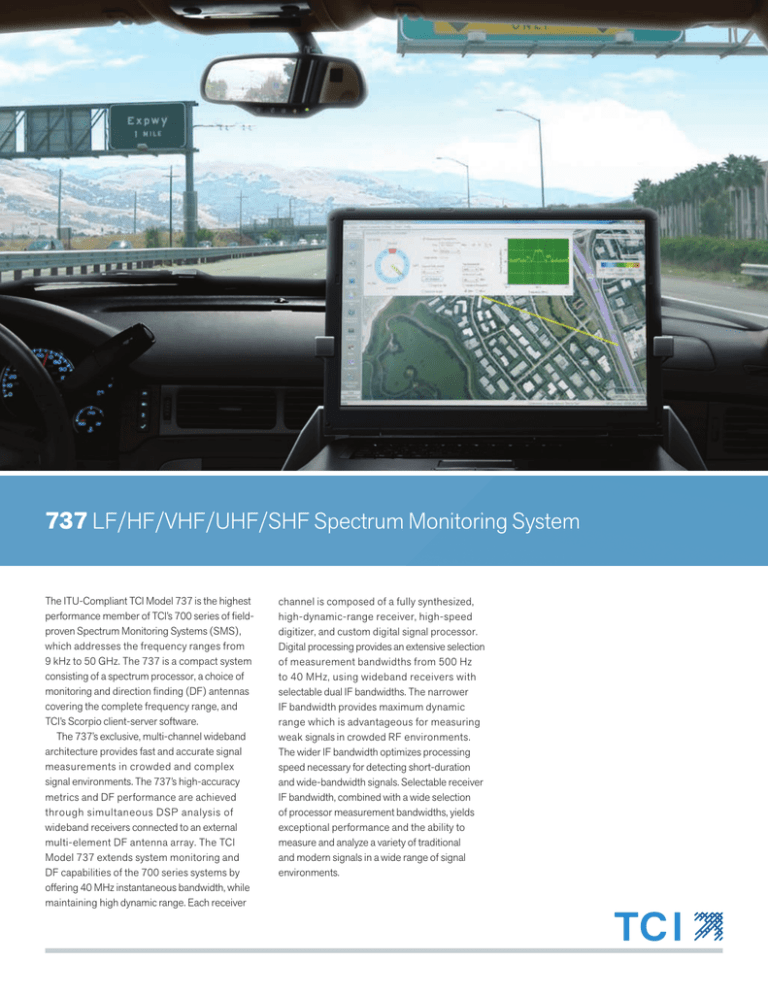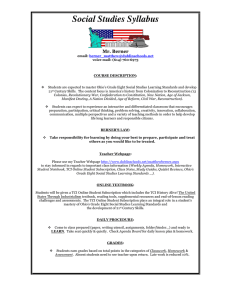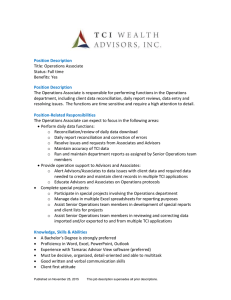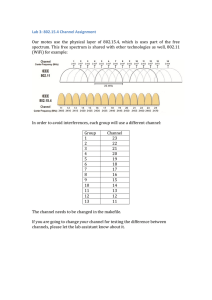
737 LF/HF/VHF/UHF/SHF Spectrum Monitoring System
The ITU-Compliant TCI Model 737 is the highest
performance member of TCI’s 700 series of fieldproven Spectrum Monitoring Systems (SMS),
which addresses the frequency ranges from
9 kHz to 50 GHz. The 737 is a compact system
consisting of a spectrum processor, a choice of
monitoring and direction finding (DF) antennas
covering the complete frequency range, and
TCI’s Scorpio client-server software.
The 737’s exclusive, multi-channel wideband
architecture provides fast and accurate signal
measurements in crowded and complex
signal environments. The 737’s high-accuracy
metrics and DF performance are achieved
through simultaneous DSP analysis of
wideband receivers connected to an external
multi-element DF antenna array. The TCI
Model 737 extends system monitoring and
DF capabilities of the 700 series systems by
offering 40 MHz instantaneous bandwidth, while
maintaining high dynamic range. Each receiver
channel is composed of a fully synthesized,
high-dynamic-range receiver, high-speed
digitizer, and custom digital signal processor.
Digital processing provides an extensive selection
of measurement bandwidths from 500 Hz
to 40 MHz, using wideband receivers with
selectable dual IF bandwidths. The narrower
IF bandwidth provides maximum dynamic
range which is advantageous for measuring
weak signals in crowded RF environments.
The wider IF bandwidth optimizes processing
speed necessary for detecting short-duration
and wide-bandwidth signals. Selectable receiver
IF bandwidth, combined with a wide selection
of processor measurement bandwidths, yields
exceptional performance and the ability to
measure and analyze a variety of traditional
and modern signals in a wide range of signal
environments.
737 VLF/LF/HF/VHF/UHF/SHF/EHF Spectrum Monitoring System
Employ maximum wideband processing
performance in complex environments.
K E Y F E AT U R E S
•
Field-proven spectrum monitoring and geolocation solutions used by over
50 regulatory authorities worldwide.
•
Fully integrated, ITU-compliant spectrum monitoring and direction finding
(DF) system.
•
20 to 3,000 MHz monitoring and DF, with optional extended frequency range
down to 9 kHz and up to 50 GHz.
•
•
Choice of multiple wide-aperature direction finding and monitoring antennas.
•
•
•
•
•
•
Dual IF bandwidth supports high scanning rates and high dynamic range.
•
•
•
•
Interoperable with all TCI 700 series spectrum monitoring systems.
•
•
•
Signal capture in I & Q format with signal analysis.
Multi-channel receiver and processor are fully integrated to provide exceptional
direction finding speed and measurement accuracy.
Selectable measurement bandwidths from 500 Hz to 40 MHz.
Built-in self-test and self-calibration.
Highly integrated antenna and spectrum processor units.
Easy operation via client-server architecture with built-in networking capability.
From stand-alone to nationwide deployment in fixed, mobile and transportable
configurations.
Client software automatically configures itself to each connected server.
TDOA (Time Difference of Arrival) measurements.
Hybrid geolocation that combines Angle of Arrival (AOA) and/or TDOA
measurements.
High scan speed mode for transient signal capture.
Optional front panel display for operation and monitoring functions.
System Details 737
System Details
All Spectrum Processor functions are controlled
by a CPU that is contained within a single, compact
4U, 19-inch rack-mount unit. The spectrum
processor includes a solid state disk drive and
does not require an Uninterruptible Power Supply
(UPS). Robust construction makes the TCI Model
737 system ideal for portable, transportable and
mobile applications, as well as fixed locations with
unreliable power delivery.
Lower
Lifecycle Cost
TCI’s more than 45 years of experience in
designing, installing, and maintaining spectrum
monitoring equipment has made the 700 series
systems best-value solutions that offer the
highest performance and reliability. Because all
700 series systems are field-repairable and selfcalibrating, they do not require field or factory
calibration after repair or extended use. And all
utilize the same easy-to-use Scorpio software
to minimize training costs, with Built-in Self Test
(BIST) capabilities and self-calibrating antenna
technology to reduce maintenance costs and
achieve the lowest lifecycle ownership cost.
TCI Spectrum Processor - Front Panel
Antennas For
Every Application
The TCI 737 system is easily configurable to
operate a variety of monitor and DF antennas. All
antennas include the DF and monitor elements
in a single package. Please refer to separate
datasheets for complete technical specifications
of compatible antennas for fixed, mobile and
transportable applications.
TCI 641 V/UHF Vertical Polarization
Full Compliance
With ITU
Recommendations
The 737 system is fully compliant with ITU-R
recommendations as outlined in the 2011
International Telecommunications Union
Spectrum Monitoring Handbook. The 737
provides comprehensive spectrum monitoring
and analysis that meets or exceeds all ITU
recommendations for the measurement of
frequency, field strength, occupied bandwidth,
modulation, direction finding, spectrum
occupancy, and automatic violation detection.
TCI 643, V/UHF Dual Polarization
TCI 645 V/UHF compact antenna,
directly mountable on vehicle roof rack
TCI 647 V/U/SHF DF and monitoring
3
737 System Details
HF
Fixed/Mobile
HF
Fixed
HF
Mobile
V/U/SHF
Portable/Compact Mobile
V/UHF
Fixed/Mobile
V/U/SHF
Dual Polarization
S/EHF
Fixed/Mobile
TCI Spectrum Processor
OPTIONAL
HF
EXTENSIONS
SCORP IO
SERVER
S O F T WA R E
SERVER
CPU
VHF/UHF
RECEIVERS
DSP
OPTIONAL
S/EHF
EXTENSIONS
SYST E M
I N T E R FA C E
Scorpio Software Client
Modular Architecture For Maximum Flexibility
❮ Interior of Mobile
Station
Mobile Station configured with Compact
645 antenna
4
System Details 737
User-Friendly
Software
TCI’s Scorpio™ client software controls the
737 system. Scorpio software incorporates
a wide variety of powerful graphical displays
with easy-to-use features, such as drop-down
boxes and automatic default values (where
appropriate) to enhance understanding and
simplify operations. Scorpio software can be
operated interactively, allowing the operator
full control of the measurements and displays
with instantaneous feedback, or in automatic
scheduled mode without operator intervention.
In scheduled (calendar) mode for unattended
operation, Scorpio automatically initializes and
starts operation when power is applied.
Field Strength Results
Hybrid AOA + TDOA Geolocation Display
Automatic Operation
Scorpio software allows automatic measurements
of signal parameters in accordance with ITU
recommendations. The Scheduled mode’s
calendar feature lets Scorpio Clients reserve
time slots on a selected Scorpio Server to make
requested measurements. A single Scorpio Server
measurement station can handle requests from
multiple Scorpio Clients, allowing data collection
from multiple systems in different locations. These
facilities are used to verify compliance with license
requirements on a scheduled basis.
Automatic Violation Detection (AVD), another
powerful Scorpio tool, verifies compliance
of licensed emitters and detects unlicensed
operations. AVD operates in conjunction
with license data (frequency assignments)
downloaded from the Spectrum Management
System database. AVD determines whether a
particular transmission complies with tolerances
of assigned center frequency and bandwidth, as
specified for the allocated band and service in the
National Frequency Plan table. It also will report
frequencies operated without a corresponding
license in the Management database and provide
an alarm notification. AVD measurements can be
performed on a single-frequency or on a range of
frequencies specified by the Operator.
Pushbutton DF Display
Spectrum Phosphor Display
Signal Constellation Display
5
737 Summary Specifications
Powerful Tools
for Detecting and
Analyzing Signals
Scorpio software gives the operator a wide variety
of capabilities to find, identify, and record specific
emitters—often unlicensed pirate stations or
sources of interference. These facilities include
extensive direction finding tools to locate the
target emitter using both fixed and mobile stations.
The operator can use the Spectrum Panoramic
(or Pan) display, an X-Y plot of signal amplitude
versus frequency, to view and identify signals
and signal relationships in the spectrum, and to
investigate interference sources. Several views
are also assembled in single screens, such as
Pushbutton DF, for comprehensive analysis of
signal parameters and their location.
When two or more systems are networked,
DF Line of Bearing (LOB) measurements on the
signal can be used to triangulate and determine
the emitter location. When one system is installed
in a vehicle, the Homing DF screen allows quick
and effective location of emitters while moving.
The software processes the LOB data obtained
from DF measurements at different vehicle
positions and calculates the position or “FIX”
on the transmitted signal. Global Positioning
System (GPS) data records the mobile station
location and a digital electronic compass reports
the vehicle heading. This provides a basic tool
to locate emitters and investigate sources of
interference around the affected stations.
6
Model 737
Technical Overview
Single Integrated
Multi-Channel DF
Monitor/DF Antenna Processing
By combining wide-aperture multi-element
DF and monitoring antennas, TCI provides
unparalleled performance in an integrated
package. This design is optimized for high
sensitivity over its full frequency range.
Built-In-Self-Test
(BIST)
Comprehensive BIST and self-calibration
have been fully integrated into TCI 700 series
equipment from the beginning. When BIST is
requested, testing starts with the CPU and DSP,
and progresses through all system components
to the antenna elements. If a component fails
BIST, the BIST function continues testing to
obtain a complete picture from multiple failures,
if they occur. The BIST results can be reviewed
either at a high level suitable for Operators, or
in a detailed view suitable for Maintenance
Technicians. A full BIST report in simple text form
can be sent to TCI for expert review, if desired.
Self-calibration eliminates the need for additional
test and calibration equipment and greatly
simplifies system maintenance.
Using patented automatic receiver matching, the
TCI 737 system provides superior performance
when compared to single channel systems that
utilize the same antenna configuration. TCI’s
multi-channel approach is signal modulation
independent and offers much faster DF speed
than typical single channel systems that must
perform four times more switching operations.
Dual Instantaneous
Bandwidth (IBW)
As an engineering company, TCI understands
the competing challenges involved in designing
and manufacturing the widest, fastest, and bestperforming wideband receivers for use in its
spectrum processors. This is why TCI receivers
have TWO operator-selectable RF front ends.
The full-wideband front end provides a highperformance receiver suitable for fast scans
and working with modern signal modulations
such as GSM. The narrower-bandwidth front
end effectively lowers the noise floor, making
the system more sensitive to low-level signals,
particularly in crowded signal environments.
Summary Specifications 737
Model 737 Comprehensive
Specifications Overview Reporting
Capabilities
❯ Signal Parameter Measurements
Frequency Measurements
Per ITU-R SM.377
Occupied Bandwidth Measurements
Per ITU-R SM.443
Field Strength Measurements
Per ITU-R SM.378
Modulation Measurements
Per ITU-R SM.328
❯ Spectrum Occupancy
Measurement Method
Per ITU-R SM.1880
Channel Bandwidth
6.25 - 600 kHz (selectable)
Channel Measurement Rate
Variable (depending on channel bandwidth)
Signal Characteristics Record
Signal strength, percent occupancy, message length, and percent
occupancy vs. time of day
❯ Direction Finding
Measurement Method
Per ITU-R SM.854
DF Accuracy
0.1° RMS (Instrument accuracy)
2° RMS typical, 1° RMS in scatter free environment
DF Resolution
0.1°
DF Method
Optional HF Interferometer or Watson-Watt*
Multi-channel — Correlative Interferometer (V/UHF)
*10° RMS typical for Watson-Watt
The 737 system’s comprehensive text and
graphical capabilities allow automatic report
generation, or access to the data to create reports
using MS Office™ (included with the system).
Reports are based on measurements, as well
as different data records available in the system
databases, such as raw trace information, carrier
analysis by date or band, channel-occupancy and
availability statistics, message-length statistics,
and channel-power statistics.
Expandability
The Scorpio system’s modularity and powerful
core capability make it easily adaptable to future
needs. Future expansion possibilities include:
•
•
•
•
Addition of future mobile units and fixed
stations by adding them to the flexible network
architecture.
Upgrading hardware and software to extend
the frequency range.
Additional operator workstations.
Analysis and demodulation of future
communication formats through upgrade
of analysis algorithms in the TCI Spectrum
Processor.
❮ Mobile Station configured with TCI 643
Dual-Polarized antenna
7
T C I I N T E R N AT I O N A L , I N C .
3541 Gateway Blvd.
Fremont, CA 94538-6585 USA
TEL: 1-510-687-6100
USA: 1-800-824-8074
FAX: 1-510-687-6101
www.tcibr.com
Specialized Expertise in a Global Family
TCI International, Inc., a leading supplier of end-to-end, ITU-compliant RF spectrum
monitoring and management products, is a wholly-owned subsidiary of SPX Corporation.
Based in Charlotte, North Carolina, SPX Corporation (NYSE: SPXC) is a global,
multi-industry manufacturing leader. SPX team members collaborate across business
segments and borders to deliver greater efficiencies and better ideas for helping
customers succeed.
At TCI, this commitment to innovation supports an array of customers whose missions
depend on having a clear picture of their electromagnetic environment. For over 45
years, TCI’s technical developments and advanced production capabilities have earned it
a reputation for excellence in high-performance communications, spectrum monitoring
and signals intelligence systems.
TCI’s diverse hardware and software engineering capabilities provide proven solutions
for regulatory compliance, monitoring and security, and communications intelligence
applications. With advanced spectrum mapping and analytics, data recording and
precision geolocation technology, TCI systems provide vital data for government and
military agencies in over 100 countries worldwide.
Company proprietary
Data and specifications subject to change without notification
Not for distribution without prior permission from TCI.
737-12-09-15
© 2014-2016 – All Rights Reserved






